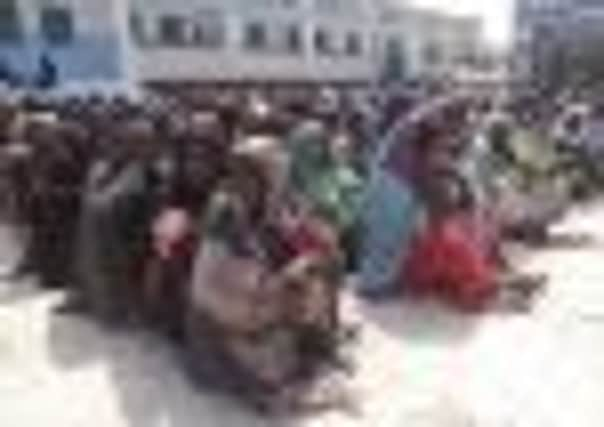Europe must do more to combat famine in Africa, says Cameron


Speaking after an hour-long meeting with members of the Somalian community in Birmingham yesterday, the Prime Minister said the UK had shown “strong leadership” in its efforts to alleviate the crisis.
Famine has been officially declared in two regions of Somalia following the worst drought in 60 years – affecting more than 10 million people in Ethiopia, Kenya, and the newly-created Republic of South Sudan.
Advertisement
Hide AdAdvertisement
Hide Ad“Britain has spent £90m – other countries are not doing as much and frankly, they need to do more,” he said.
“We have done the most and my aid Minister has been to the Horn of Africa to see for himself what needs to be done.
“We have three-and-a-half million people affected by famine and two million of those are not getting any help.
“It’s time for other European countries to start doing what Britain is doing, and to give more to make sure the aid gets through and we save lives.”
Advertisement
Hide AdAdvertisement
Hide AdDuring his visit Mr Cameron acknowledged that long-term solutions were required in Somalia, but stressed that more aid was urgently needed.
The Prime Minister added: “Of course, in the longer term there is a huge amount more to do to strengthen government in Somalia, to build the resilience of Somalia, but right now people are dying.
“Their lives could be saved by some aid. Britain is playing its part – others have got to play their part too.
Meanwhile Labour leader Ed Miliband was given a tour of the Disasters Emergency Committee’s offices in London by chairman Clive Jones and chief executive Brendan Gormley.
Advertisement
Hide AdAdvertisement
Hide AdHe took time to view the response of the DEC aid agencies on an interactive map of East Africa before meeting staff and making a donation via text message on his phone.
Mr Miliband said the problem was a “real emergency”, with hundreds of thousands of people flowing across borders, facing extreme drought and “at risk of death”, adding: “We need to act.”
Mr Gormley said the British public had been “stunningly generous”.
However, he added: “The gap between what is needed and what can be paid for is still sadly enormous.”
Advertisement
Hide AdAdvertisement
Hide AdHe said the money that had been donated so far would go towards paying for the “absolute basics of life” including clean water, food and shelter.
The need, he said, was across the whole of East Africa following the widespread crop failure, with families now on the move towards Mogadishu, Somalia’s battle-worn capital.
Unicef was preparing to airlift another 105 tonnes of food and medical supplies to the region, and a shipment will leave for the Horn of Africa in the next few days.
So far 1,300 tonnes of emergency supplies have been sent to the area.
Advertisement
Hide AdAdvertisement
Hide AdThe charity’s UK executive director David Bull said: “We have stepped up our response even more as the death rate among severely malnourished children under the age of five in Lower Shabelle in south Somalia has climbed dramatically.
“They are now dying at a rate of more than 250 per day – that’s one child every six minutes.
“This is totally unacceptable and we must all act now to help save lives.”
Unicef estimates it will need £62.8m over the next six months to help children affected by the drought.